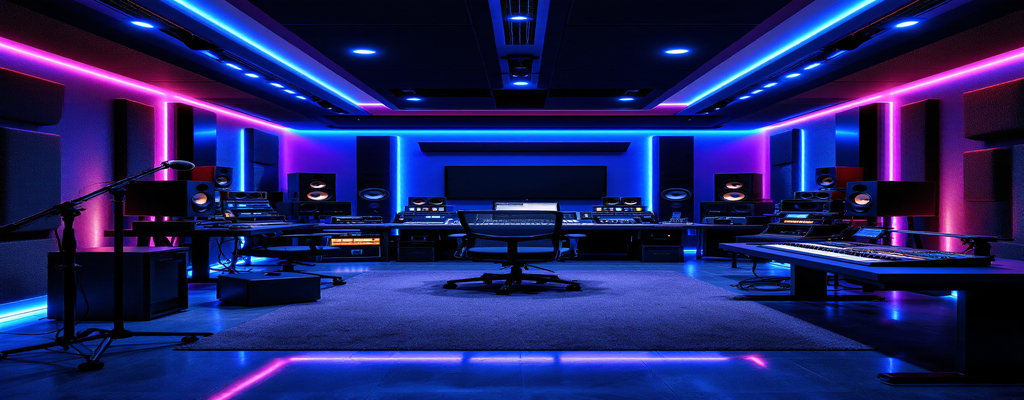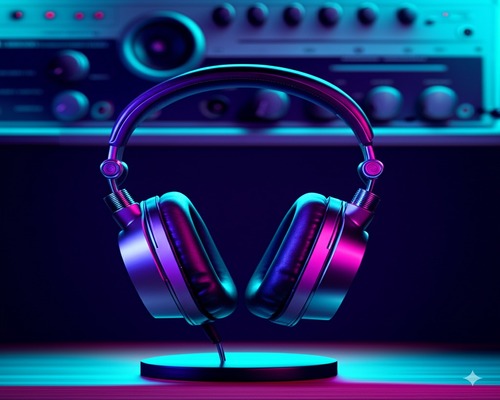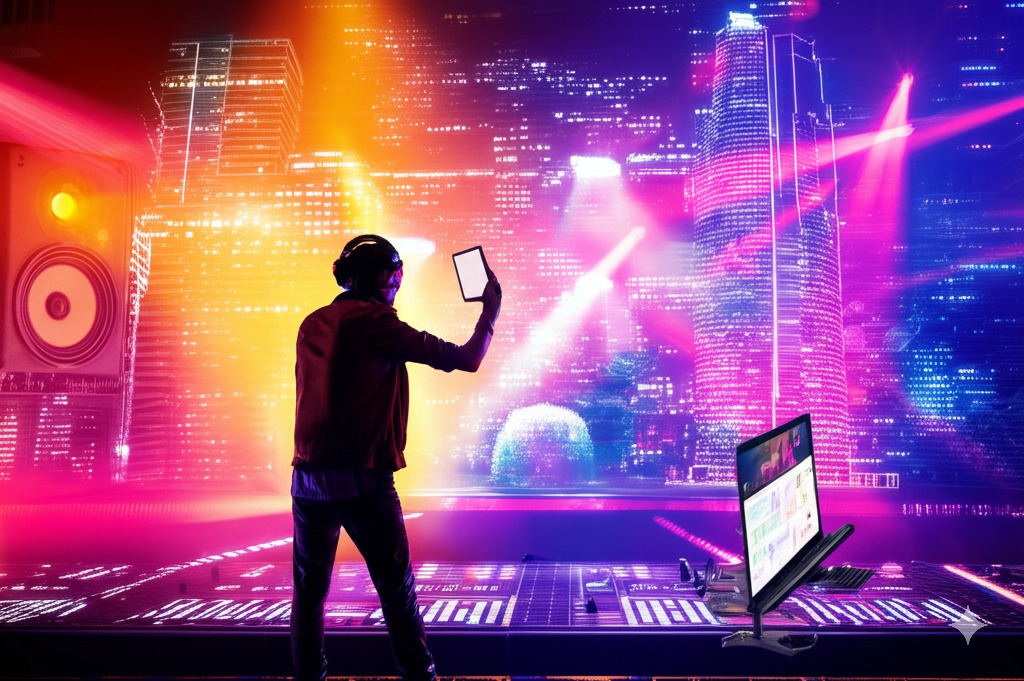
How the Impact of AI in Music is Transforming the Industry
Music and AI are teaming up in some pretty amazing ways these days. The impact of AI in music isn’t just some far-off idea anymore – it’s happening right now, and the numbers show it’s changing everything about how songs get made and heard.
Think about it – not that long ago, making professional-sounding music meant spending thousands on studio time and equipment. Now? A teenager with a laptop and the right AI music tools can create tracks that sound like they came from a big-budget studio. What used to be just a wild dream – computers that help write melodies, create unique sounds, mix tracks, and master recordings – is now something thousands of musicians use every day.
The stats are pretty mind-blowing. The music industry AI market is set to grow from about $4 billion now to nearly $39 billion in just ten years. That’s not just a little change – that’s a complete revolution in how the music world works!
The cool thing is how musicians are actually using this stuff. They’re not just letting artificial intelligence music do all the work – they’re using it more like a super-smart assistant or collaborator. A hip-hop producer might ask an AI to suggest some drum patterns, then pick the one that feels right and build on it with their own ideas. A singer-songwriter might use AI to help with chord progressions when they’re stuck, then take those chords in their own direction.
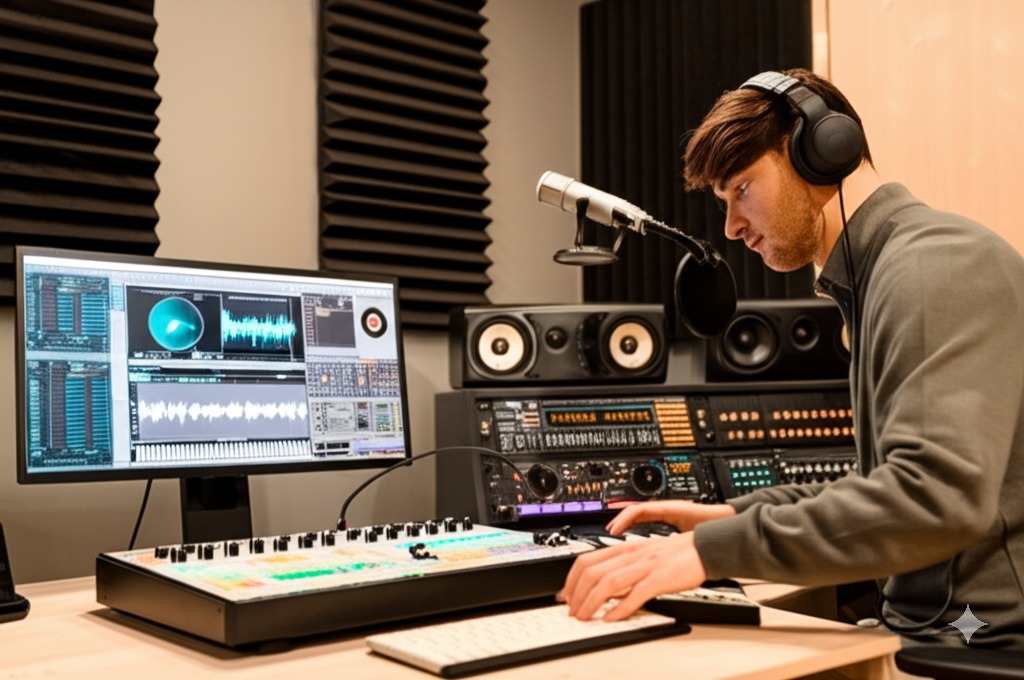
Nearly 60% of musicians are already using AI music platforms in some way. That’s not just tech geeks or experimental artists – that’s mainstream creators across pretty much every style of music you can think of. And for younger musicians under 35, the numbers are even higher.
But this whole shift brings up some interesting questions about music creation. When an AI suggests a melody or helps clean up your mix, who really made the music? And how will this affect people who make a living from music? The stats show some musicians are worried – about 71% fear AI might make it harder to earn a living from their art.
In this article, we’ll look at the numbers behind how AI is changing the music industry – from writing the first notes to getting that final track to listeners’ ears. We’ll see how it’s affecting different types of musicians, how listeners are responding (spoiler: 82% can’t tell AI music from human music in blind tests!), and what it all means for the future of the industry.
Whether you make music yourself, just love listening to it, or are curious about how technology is changing creative work, these stats tell a fascinating story about where things are headed in this fast-changing musical world.
The Explosive Growth of AI in the Music Market: Numbers Don’t Lie
The AI music technology market isn’t just growing a little bit each year – it’s absolutely exploding. According to recent stats, the global AI in music market is expected to jump from $3.9 billion in 2023 to a whopping $38.7 billion by 2033. Check the data
That’s like going from a garage band to selling out stadiums in just a decade! And it’s not just about cool tech for tech’s sake – AI-generated music is expected to boost the music industry’s overall revenue by 17.2% by 2025. When was the last time the music business saw that kind of growth in such a short time? Read more about AI revenue growth
So what’s driving all this growth? It’s pretty simple – AI music technology is making things possible that were either super expensive or just plain impossible before. Think about it: when an AI can whip up a basic track in seconds instead of the hours it might take a human composer, everything speeds up. More music gets created faster and cheaper, which means content creators, game developers, and advertisers who need custom music can actually afford it now.
This isn’t just about new gadgets for music nerds – it’s a complete game-changer in how music gets made and sold. As these tools get better and cheaper, we’re probably going to see these numbers grow even faster in the next few years. The impact of AI in music is just getting started.
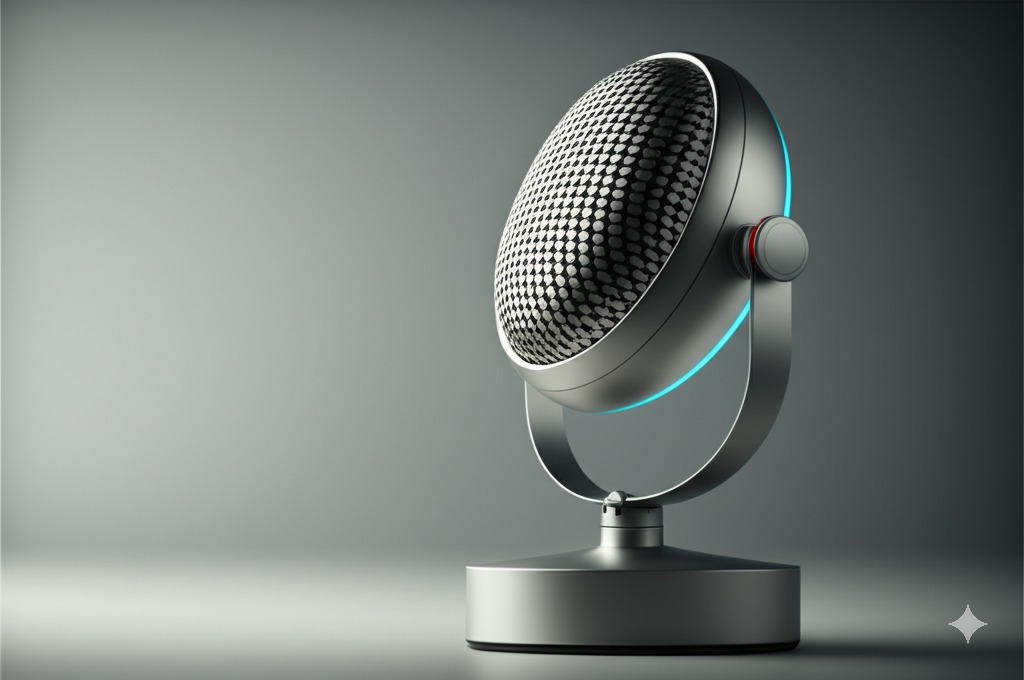
Real Musicians Using AI: How Different Artists Are Jumping on Board
So who’s actually using this stuff? Pretty much everybody, it turns out. About 60% of musicians say they’re already using AI in music production for all kinds of tasks – from mastering tracks to coming up with new melodies to even creating artwork for their albums. These aren’t just hobbyists playing around – these are working professionals making AI part of their everyday process. Source details
When you break it down by genre, it gets even more interesting:
- Electronic music producers are leading the way with 54% already using artificial intelligence in music production
- Hip-hop creators are right behind at 53%, using AI for beats, samples, and more
- Even in advertising music, 52% of creators are using AI to help meet tight deadlines and specific briefs
Learn more about AI adoption by genre
This totally busts the myth that artists are afraid of new tech. The truth is, musicians have always been quick to try new tools – from electric guitars to synthesizers to digital recording software. AI and music creation is just the latest chapter in musicians being tech-forward.
How they’re using it varies a ton. Some artists use generative AI music to get started when they’re staring at a blank page. Others let AI handle the technical stuff like mixing so they can focus on the creative parts. And some are using AI to explore totally new sounds that nobody’s heard before.
The really cool thing is that most artists don’t see AI for music creators as competition – they see it as a collaborator. When AI handles the boring or technical parts, human artists can focus on the emotional stuff that machines still can’t quite nail. Instead of replacing musicians, these tools are helping more people make music, especially those who don’t have access to expensive studios and equipment.
How AI Is Changing the Way We Listen to Music
The impact of AI in music isn’t just about making songs – it’s completely changing how we find and enjoy music too. A massive 74% of internet users have used AI in some way when discovering or sharing music, often without even knowing it. Those playlists that somehow know exactly what you want to hear next? That’s AI music platforms working behind the scenes. More information
Here’s a stat that might blow your mind: 82% of music listeners can’t tell the difference between songs made by humans and AI-generated tracks in blind tests. That’s pretty wild when you think about it. If a song makes you feel something, does it really matter whether a person or a computer came up with the melody? As these tools get better, this line is only going to get blurrier. Discover more statistics
The speed of artificial intelligence music creation is mind-boggling too. Current tech can create a basic melody in less than 2 seconds – something that might take a human songwriter minutes, hours, or even days of trying different things. That doesn’t mean AI is “better” than human composers, but it sure can try out ideas faster! Find out more
Think about how streaming services use AI music technology to figure out what you might like. These systems don’t just look at genres – they analyze hundreds of things about each song, from tempo and instruments to mood and lyrics. This gives you much better recommendations than radio ever could.
For listeners, this means finding new artists you’ll love is easier than ever. For artists, it means potentially reaching exactly the right fans who will dig their particular style. This personalization is one of the less obvious but super powerful ways that how AI is changing the music industry is creating direct connections between creators and fans.
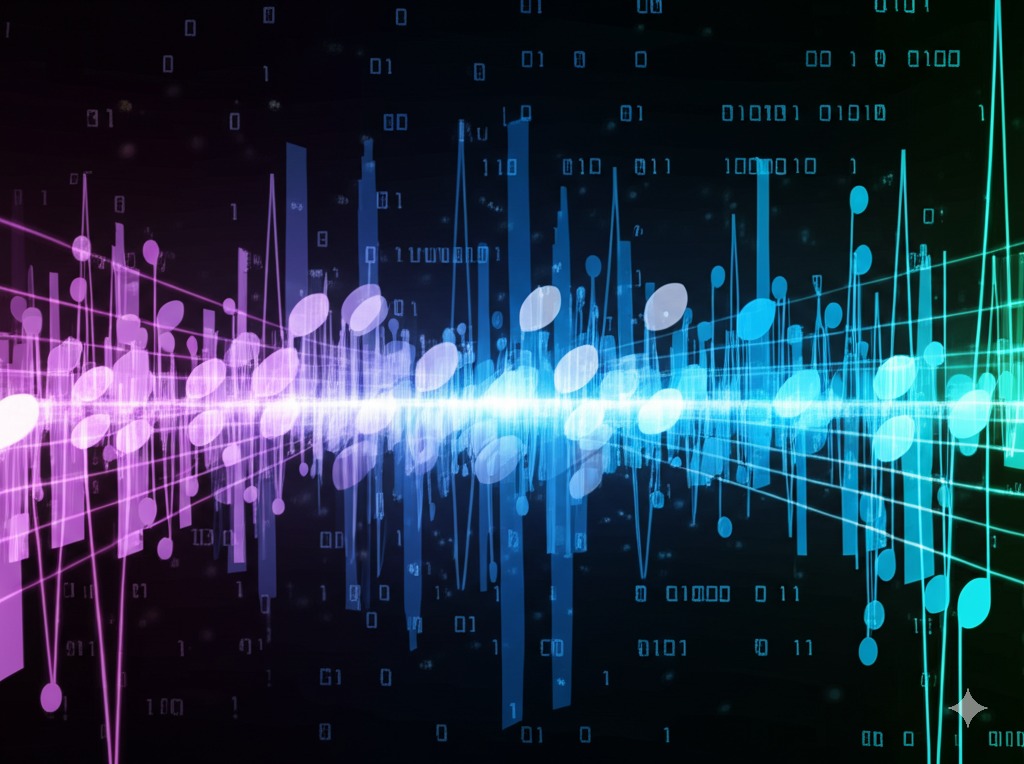
Show Me the Money: AI’s Impact on Music Industry Dollars
The financial side of how artificial intelligence is shaping music production is pretty eye-opening. By 2028, AI-generated music could make up about 20% of traditional music streaming revenues. That’s a massive shift in where money flows in the industry, potentially redirecting billions of dollars in just a few years. Read the full report
The generative AI music industry itself is growing crazy fast:
- It’s projected to hit $2.92 billion by 2025
- By 2034, that number could reach $18.47 billion
- Looking at the shorter term, the global market will grow from $300 million in 2023 to $3.1 billion by 2028
Get more details on market growth Additional market information
These statistics on AI-generated music in the music industry aren’t just random numbers – they represent a complete reshuffling of how money moves through the music business. Companies developing effective AI music tools stand to grab big chunks of this growing market.
The economics go beyond just making songs. AI is changing how music gets discovered, promoted, and monetized. Streaming platforms use smart algorithms to match songs with the listeners most likely to enjoy them, which can help smaller artists find their audience without needing huge marketing budgets.
Stock music libraries, which provide background tracks for videos and ads, are being especially affected by AI music platforms. When an AI can create custom tracks on demand that fit specific moods or brand feelings, pre-made stock music starts looking less appealing. That’s why AI-generated tracks could make up 60% of music libraries’ revenues by 2028 – a shift that’s already happening as content creators embrace the cost benefits of AI soundtracks.
For traditional music industry players, these changes present both challenges and opportunities. Those who adapt by using AI in music production will benefit from increased efficiency and new creative possibilities. Those who resist might find themselves struggling to keep up with AI-powered competitors who can produce more music, faster, and cheaper.
The Tough Questions: Challenges for Musicians in the AI Era
Despite the opportunities, the impact of AI on music creators and musicians raises some real concerns about making a living as an artist. A significant 71% of surveyed music creators worry that AI could make it impossible to earn a living from their work. This isn’t just paranoia – it’s based on seeing how AI is already changing creative industries. Learn more about creator concerns
The worry extends beyond music. In related creative fields, translators and voice actors could see up to 56% of their revenue at risk due to AI by 2028, while screenwriters and directors could face 15-20% revenue loss in the same timeframe. These similar trends across creative industries suggest music industry AI is part of a bigger transformation affecting all kinds of creative work. See the complete study
The financial implications are pretty sobering. Over the next five years, music creators could collectively lose up to €10 billion, with an expected annual loss of €4 billion in 2028 due to displacement by AI-generated music. That’s real money that currently supports artistic careers and creative communities. Learn about financial impacts
The challenges aren’t just about money but also about deeper questions of creative identity. When an AI can analyze an artist’s entire catalog and make new works in their style, things get complicated. Who owns a melody that sounds like Artist X but was made by an AI trained on thousands of songs including X’s music? These questions are still being figured out both ethically and legally.
There are also worries about devaluing music. If people start thinking music is “easy” to create because AI can make it quickly, will they still value the human elements like emotional authenticity and artistic vision? Or will music become more like a commodity, with people less willing to pay for it?
Despite these valid concerns, many musicians are adapting rather than resisting. The most successful approach seems to be using AI tools for music creation and production as collaborators rather than replacements – letting AI handle routine aspects while focusing human creativity on the elements that remain distinctly human.
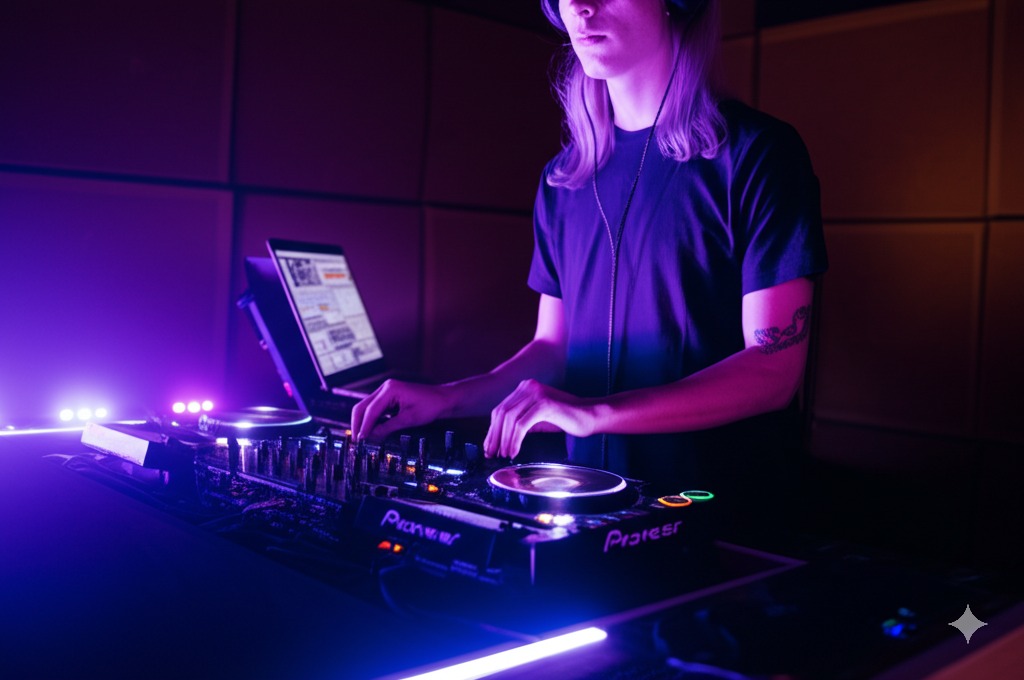
Age Matters: How Different Generations Are Using AI in Music
The stats about AI for music creators show some interesting patterns across age groups that help us understand where things are headed. Overall, 35% of music creators have already started using AI in their process. But that number jumps to 40% among creators under age 35. Discover age-related trends
This generation gap makes sense. Younger musicians grew up with technology integrated into music creation from day one. For many of them, digital workstations, virtual instruments, and algorithmic tools have always been part of making music. Adding AI music technology feels like a natural next step rather than some radical change.
The impact of AI in music is likely to speed up as these younger creators advance in their careers and gain more influence. Their comfort with technology suggests that adoption will continue to increase, potentially reaching a point where AI assistance becomes the norm rather than the exception.
What’s particularly interesting is how different generations tend to use AI music tools in different ways. Younger creators often embrace AI across their entire process, from coming up with ideas to finishing tracks. They’re more likely to view AI as a collaborative partner. Older musicians more commonly use AI for specific technical tasks while keeping creative decisions firmly in human hands.
This generation gap also shows up in attitudes. Younger creators are generally more optimistic about AI’s potential to democratize music creation and open new possibilities. Older musicians, while not necessarily against the technology, often express more concern about maintaining the human elements of music and ensuring fair compensation.
As younger AI-native musicians become more prominent, their innovative approaches to human-AI collaboration will likely reshape our understanding of what music creation looks like. Rather than humans versus machines, they’re pioneering hybrid approaches that leverage the strengths of both.
What’s Next: The Future of AI in Music Creation
As we look ahead, the future of AI in music and its market growth appears both exciting and challenging. By 2028, AI-generated music could make up 20% of traditional music streaming revenues and an even more dramatic 60% of music libraries’ revenues. These figures suggest we’re just at the beginning of a profound transformation. Read the forecast
Investment in artificial intelligence music technology continues to grow rapidly. AI music platform Amper Music secured $4 million in seed funding to develop its capabilities, and they’re far from alone. Venture capital is flowing into this sector as investors see the potential for AI to create new value in music. Investment details
Looking at how these tools are developing, several trends are becoming clear. First, AI music tools are becoming more specialized, with different tools focusing on specific aspects of creation—from melody generation to vocal synthesis, mixing, and mastering. Rather than one-size-fits-all, we’re seeing an ecosystem of specialized tools.
Second, the line between human and AI creation is blurring. The most effective approaches combine human creative direction with AI assistance. Humans are still best at emotional expression and artistic vision, while AI can handle technical details and process tons of audio data quickly. This partnership is likely how artificial intelligence in music production will develop most successfully.
Third, these tools are becoming way more user-friendly. What once required technical expertise is now available through simple interfaces that anyone can use. This democratization of AI in music production has huge implications for who can create music and what kinds of music get created.
As how artificial intelligence is shaping music production continues to evolve, we’ll likely see even more diverse musical expressions. Creators who previously lacked technical training or expensive equipment can now realize their musical visions with AI assistance. This could lead to a flowering of new musical styles that wouldn’t have been possible before.
However, this future also brings challenges around copyright, fair payment, and keeping the human touch that gives music its emotional power. How we navigate these challenges will determine whether AI music technology becomes a positive force that expands human creativity or a disruptive technology that undermines creative careers.
Wrapping It Up: AI and Music’s Evolving Relationship
The impact of AI in music is one of the biggest tech shifts the industry has ever seen. The stats we’ve explored paint a clear picture: AI is quickly becoming a key part of how music is created, distributed, and experienced. From writing songs and producing tracks to getting music to listeners and making money from it, artificial intelligence is reshaping every aspect of the musical world.
For musicians, producers, and music businesses, understanding these changes isn’t optional—it’s essential for survival and success. While the challenges are real, particularly around fair payment and creative ownership, the opportunities for innovation and creative exploration are unprecedented. AI music tools can handle technical aspects, suggest creative directions, and help artists find their audience more effectively than ever before.
As these technologies continue to develop and become more accessible, we can expect the relationship between human and machine creativity to evolve in fascinating ways. Rather than replacing human artistry, AI-generated music is more likely to become an extension of it—a powerful tool that amplifies human creative potential while handling routine aspects of production.
The most successful artists and music businesses in the coming years will likely be those who find thoughtful ways to incorporate AI into their creative process while maintaining the human elements that give music its emotional power. They’ll use AI for music creators not as a shortcut or replacement, but as a collaborator that opens new possibilities.
As listeners and music fans, we’re entering an era of unprecedented abundance and diversity in music. AI music platforms can help us find exactly the sounds that resonate with us, while AI assistance in production means more creators can bring their musical visions to life. The result could be a richer, more varied musical landscape than ever before.
The sound of the future isn’t just human or just machine—it’s a creative partnership between the two, combining human emotion and artistic vision with the technical capabilities of artificial intelligence. As this partnership continues to evolve, it promises to open new sonic territories and creative possibilities that we’re only beginning to imagine.
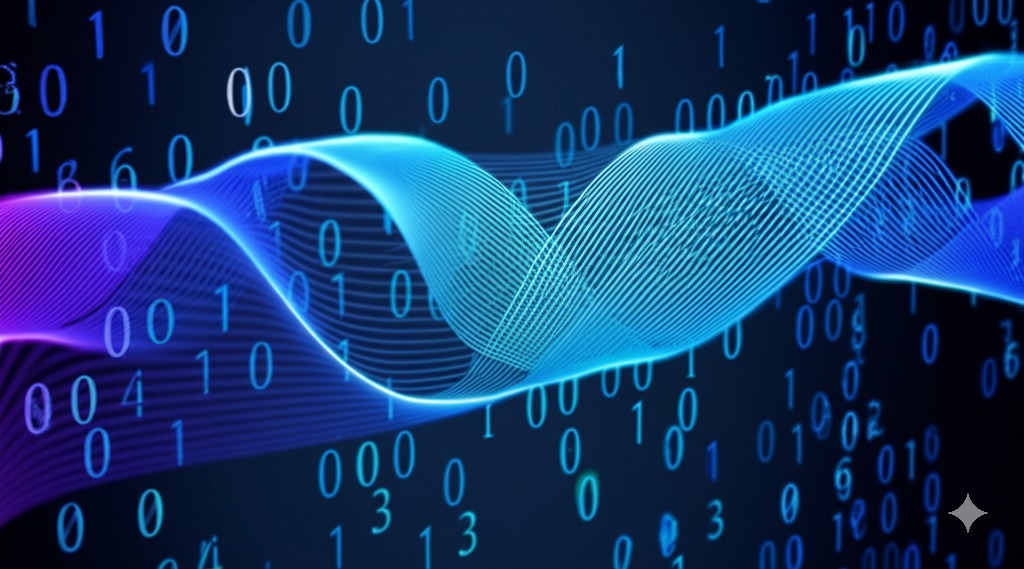
FAQ: Common Questions About AI in Music
Q: Will AI replace human musicians?
A: While AI can generate music, current technology works best as a collaborative tool for human musicians rather than a replacement. The statistics show many musicians are using AI music tools to enhance their workflow and expand their creativity, not eliminate the human element from music creation.
Q: How accurate are AI music creation tools?
A: The technology has advanced significantly, with 82% of listeners reporting they cannot tell between human and AI-generated tracks in blind tests. However, many musicians feel AI still lacks the emotional depth and cultural understanding that human creators bring to music.
Q: Are music streaming services using AI?
A: Yes, most major streaming platforms use AI music technology extensively for recommendations and playlist creation. Some platforms are also beginning to incorporate AI-generated music into their libraries, and this trend is likely to grow in coming years.
Q: How much of the music market will AI control in the future?
A: Projections suggest AI-generated music could account for 20% of traditional streaming revenues by 2028 and up to 60% of music library revenues. These figures indicate music industry AI will have a substantial but not dominant position in the overall music ecosystem.
Q: Do musicians make money from AI-generated music?
A: This depends on the specific tools and platforms used. Some AI music platforms allow musicians to retain rights to the output, while others have different licensing models. The question of fair compensation for AI-assisted music remains actively debated.
Q: How quickly is AI music technology developing?
A: Extremely rapidly – the global AI in music market is expected to grow nearly tenfold in the next decade, from $3.9 billion to $38.7 billion. This accelerating pace means today’s capabilities will likely seem primitive compared to what’s possible in just a few years.
Q: Can I use AI-generated music commercially?
A: It depends on the specific AI music tools you’re using. Many platforms offer various licensing options, from royalty-free to more restricted models. Always check the terms of service before using AI-generated output commercially.
Q: Do AI music tools need to be trained on existing music?
A: Yes, most artificial intelligence music systems learn by analyzing patterns in existing music. This raises interesting questions about copyright and attribution, as these systems are essentially learning from the work of human musicians. Some companies are developing approaches that address these concerns through licensing agreements with rights holders.
